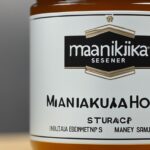When the whispers of nature offer sweet remedies, it is to the rich, amber nectar of Manuka Honey that many health enthusiasts are turning their attention. Known for centuries as a powerhouse of health benefits, this natural treasure may hold the key to effective blood sugar management. In an age where the quest for glycemic control has become paramount to maintaining vibrant health, could the indulgence in Manuka Honey be more than just a treat? Join us in unveiling the sweet connection between Manuka Honey benefits and the harmonious dance of blood sugar levels.
A balanced diet interwoven with natural remedies can lead to a life less punctuated by the highs and lows of erratic glucose readings. As we delve deeper, explore how Manuka Honey may be more than just a delectable spread, potentially offering a layer of defense in the intricate battle for controlled blood sugar. Will this sought-after honey from New Zealand be the ally you’ve been searching for in your journey towards overall well-being? Let’s embark on a path to discovery
What is Manuka Honey and Its Unique Properties
Originating from the pristine landscapes of New Zealand, Manuka Honey is not your everyday sweetener. What sets it apart are its potent health-enhancing properties, driven by the UMF factor, an abundance of methylglyoxal, and its renowned status as an antibacterial honey. Let’s look at what makes Manuka Honey a sought-after substance beyond its delightful taste.
The UMF factor, or Unique Manuka Factor, serves as a global standard in identifying and measuring the antibacterial strength of Manuka Honey. This factor is unique to Manuka Honey and directly correlates to the concentration of methylglyoxal (MGO) and other compounds within the honey, which are responsible for its powerful antibacterial properties.
Methylglyoxal, a compound found in most types of honey in only negligible quantities, is present in significantly higher concentrations in Manuka Honey. This compound is largely credited with providing Manuka Honey with its superior health properties, distinguishing it from other honeys. In addition to its antibacterial prowess, Manuka Honey is also praised for its antiviral, anti-inflammatory, and antioxidant benefits.
- Antibacterial properties known to combat certain strains of bacteria
- Supportive role in wound healing and tissue regeneration
- Soothing effects on the digestive system
- Potential to enhance oral health
Another critical aspect of Manuka Honey is how it’s sourced and the grading system that ensures its authenticity and potency. The meticulous process involves careful extraction and preservation from the flower of the Manuka bush, native to New Zealand. This is then grade-certified using the UMF scale, which guarantees the presence of key signature compounds such as methylglyoxal, dihydroxyacetone, and leptosperin.
| UMF Rating | Antibacterial Strength | MGO Content (mg/kg) |
|---|---|---|
| UMF 5+ | Low | 83+ |
| UMF 10+ | Medium | 263+ |
| UMF 15+ | High | 514+ |
| UMF 20+ | Superior High | 829+ |
When choosing Manuka Honey, the UMF rating becomes an invaluable indicator for anyone interested in its therapeutic benefits. The higher the UMF number, the higher the concentration of methylglyoxal and thus, the stronger the antibacterial effect.
In summary, Manuka Honey’s distinctive properties such as the UMF factor and its rich methylglyoxal content make it more than just a sweet indulgence. It’s a functional food with the power to support health and wellbeing in various ways. Whether it’s added to a cup of tea for its flavor or applied topically for its medicinal properties, Manuka Honey stands out as a natural remedy fortified by science.
Understanding Blood Sugar and Its Impacts on Health
The term ‘blood sugar’ refers to the concentration of glucose present in the bloodstream, a measure that plays a pivotal role in maintaining bodily functions. Glucose, a type of sugar derived from the foods we consume, is the primary source of energy for the body’s cells. Controlled by the hormone insulin, blood sugar levels fluctuate throughout the day; these fluctuations are normal but can become problematic when they’re extreme or sustained.
Blood sugar imbalances can lead to a condition known as insulin resistance, which occurs when the body’s cells do not respond effectively to insulin. Over time, this can pave the way to the development of type 2 diabetes, a chronic health condition with significant long-term consequences. It is therefore critical to recognize the symptoms and understand the health impacts of erratic blood sugar levels before they escalate into more severe conditions.

Symptoms of high blood sugar, or hyperglycemia, can include increased thirst and urination, fatigue, headaches, and blurred vision. If left unmanaged, these symptoms can lead to more severe complications such as nerve damage, kidney failure, and cardiovascular issues. Conversely, low blood sugar levels can lead to symptoms like shakiness, confusion, irritability, and in severe cases, loss of consciousness. Both conditions require immediate attention and management.
It’s not only about the immediate symptoms; the long-term impacts of unregulated blood sugar levels can be profound. Prolonged periods of imbalanced glucose levels can contribute to the progression of insulin resistance into full-blown diabetes, accompanied by its own myriad of health dilemmas, including a greater risk for heart disease and stroke. With this understanding, it becomes evident why achieving a balance in blood sugar levels is paramount for long-term health and wellness.
- Recognize early symptoms of blood sugar fluctuations
- Understand the relationship between diet and glucose levels
- Consider a balanced diet, regular exercise, and appropriate medical attention as preventive measures against insulin resistance and diabetes
Given the potential severity of these conditions, it’s essential to take proactive steps in monitoring and managing blood sugar levels. Lifestyle changes, medication, and regular check-ups are key strategies for regulation. By prioritizing blood sugar management, individuals can greatly reduce the risk of developing more severe health issues associated with diabetes and hyperglycemia.
The Relationship Between Manuka Honey and Blood Sugar
Manuka Honey, renowned for its therapeutic qualities, is often touted as a superior natural sweetener, especially in terms of how it interacts with blood sugar levels. Understanding the Manuka Honey glycemic index is essential for individuals keen on maintaining a healthy lifestyle while enjoying the sweetness that nature provides.
Compared to conventional sweeteners, Manuka Honey offers a notable advantage due to its lower glycemic index (GI). The GI is a measure of how fast carbohydrates in food raise blood sugar levels. Lower GI foods are generally preferred for those looking to manage their blood sugar, as they cause a slower, more gradual increase, rather than the sharp spikes associated with high-GI sweeteners.
However, it’s worth noting that while Manuka Honey has a more favorable profile than refined sugars, its impact on blood sugar levels can vary among individuals. The unique composition of Manuka Honey, which includes natural sugars like fructose and glucose, requires mindful consumption, especially by those with diabetes or insulin resistance.
| Sweetener | Glycemic Index | Notes |
|---|---|---|
| Manuka Honey | 55-65 | Lower GI, beneficial components |
| Table Sugar (Sucrose) | 65-100 | Higher GI, causes faster blood sugar spikes |
| High-fructose Corn Syrup | 73-90 | High GI, linked to various health issues |
When discussing natural sweeteners, it’s important to understand that while they might be a healthier choice, they still contain calories and sugars that can affect blood sugar. Manuka Honey’s role in a balanced diet must be considered in light of its full nutritional profile, and not just its glycemic index.
- Manuka Honey can be a part of a balanced diet when used in moderation.
- Individuals with specific health conditions should consult a healthcare provider before making it a regular part of their diet.
- Pairing Manuka Honey with foods high in fiber, protein, or healthy fats can balance the overall glycemic effect.
Ultimately, the science surrounding the benefits of Manuka Honey is evolving. Still, what remains clear is that its inclusion in a diet must be thoughtful and intentional, with an emphasis on moderation and overall dietary balance to support optimal health and maintain steady blood sugar levels.
Manuka Honey as a Sugar Substitute: Pros and Cons
In today’s health-conscious age, many individuals seek sugar alternatives that align with their nutrition goals, particularly for those managing diabetes. Manuka Honey for diabetics represents an intriguing option due to its natural origins and distinct properties. It is known for being a low-glycemic sweetener, which is why it’s gaining traction among those looking for healthful sugar substitutes. However, like any food product, it comes with its own set of advantages and limitations.
Let’s delve into the pros and cons of using Manuka Honey as an alternative to traditional sugar, providing a balanced perspective for those considering incorporating it into their diet.
- Pros
- Known for its potential anti-inflammatory and antibacterial benefits.
- Lower glycemic index than regular sugar, which may prevent rapid spikes in blood sugar.
- Contains vitamins, minerals, and antioxidants not present in refined sugars.
- Favorable for those seeking organic and natural diet options.
- Cons
- Despite being natural, it is still high in calories and can contribute to weight gain if not consumed in moderation.
- Can be expensive compared to other sweeteners, which may not be viable for everyone’s budget.
- Individuals with diabetes need to monitor their overall carbohydrate consumption closely when including Manuka Honey in their diet.
When considering Manuka Honey versus other sweeteners, it’s important to review how it stacks up in terms of nutritional value and glycemic index. Here is a comparative overview:
| Sweetener | Glycemic Index (GI) | Calories per tablespoon | Carbohydrates per tablespoon (grams) |
|---|---|---|---|
| Manuka Honey | 55-59 | 64 | 17.3 |
| Regular Honey | 58-65 | 64 | 17.3 |
| White Sugar | 65 | 49 | 12.6 |
| Agave Nectar | 15-30 | 60 | 16 |
In conclusion, while Manuka Honey provides a lower-glycemic alternative to conventional sugars and boasts nutritional benefits, evaluating its role in a balanced diet is paramount, especially for those with specific health considerations such as diabetes. As with any dietary change, it’s advisable to consult with a healthcare professional to tailor an approach that suits one’s individual health needs.
Scientific Research on Manuka Honey and Glycemic Control
In the quest to understand the health impacts of honey, specifically Manuka Honey, a considerable body of academic studies has emerged. These research endeavors aim to shed light on the role of Manuka Honey in glycemic response and its potential inclusion in diets aimed at better glycemic control. This article goes through some of the salient research papers and findings from this intriguing area of study.
Recent Manuka Honey research undertaken by various health research institutions has highlighted a measured effect on the glycemic index when ingesting this natural product. To put this burgeoning area of scientific inquiry into perspective, we will look at some of the findings from peer-reviewed journals and clinical trial databases. These findings are momentous, as they provide a clearer understanding of the relationship between Manuka Honey consumption and blood sugar regulation.
| Study | Sample Size | Focus Area | Outcomes |
|---|---|---|---|
| ‘Impacts of Manuka Honey Intake on Blood Glucose Levels’ | 30 | Immediate glycemic response | Lower postprandial raise in blood glucose compared to sucrose |
| ‘Manuka Honey’s Long-term Effects on Glycemic Control’ | 50 | Long-term glycemic control | Improved fasting glucose levels over 3 months |
| ‘Comparative Analysis of Manuka Honey and Other Sweeteners’ | 100 | Glycemic Index (GI) comparison | Manuka Honey showed a moderately lower GI than common table sugar |
As evidenced by these studies, Manuka Honey elicits a range of responses that can influence blood glucose levels. It’s important for readers to note that while these results are promising, they represent a complex interplay of many factors including individual metabolic responses, lifestyle, and overall diet. Hence, Manuka Honey should be considered as part of an integrated approach to health rather than a standalone remedy.
The ongoing exploration of Manuka Honey in academic circles continues to paint a promising picture of its potential role in managing glycemic response. This research contributes vital insight to the discussions around natural remedies and their place in a proactive health regimen.
How to Integrate Manuka Honey Into Your Diet

Integrating Manuka Honey into your daily routine can be a delightful way to enhance the nutritional profile of your meals while indulging in its rich, distinctive flavor. Discover the seamless blend of health and taste with these dietary tips that highlight Manuka Honey recipes and emphasize the pursuit of a balanced diet.
Start with a spoonful: Begin your day by stirring a spoonful of Manuka Honey into your morning tea or drizzling it over your oatmeal for a touch of sweetness that comes with a host of health benefits.
Wholesome smoothies: Enhance your fruit smoothies by adding a teaspoon of Manuka Honey. It pairs wonderfully with banana, berries, and a splash of almond milk for nourishing refreshment.
Salad dressing twist: Create a homemade vinaigrette with Manuka Honey, extra virgin olive oil, apple cider vinegar, and a squeeze of lemon for a healthier dressing option that’s both zesty and immune-boosting.
Savory marinades: Elevate the flavors of chicken or tofu by marinating them in a Manuka Honey-infused sauce. Combine honey with soy sauce, garlic, and ginger for a dish that is sure to please your palate.
As with any dietary changes, moderation is key to maintaining a balanced diet. Here’s a table of creative Manuka Honey pairings that can help diversify your healthy eating plan:
| Meal Time | Manuka Honey Pairing | Healthy Eating Benefit |
|---|---|---|
| Breakfast | Manuka Honey on wholegrain toast | Provides energy and supports digestive health |
| Lunch | Manuka Honey mustard dressing for salads | Combines sweetness with anti-inflammatory properties |
| Afternoon Snack | Manuka Honey with Greek yogurt and nuts | Bolsters immune function and satisfies hunger |
| Dinner | Manuka Honey glazed root vegetables | Enhances meal flavor while providing antioxidants |
Incorporating Manuka Honey into your diet not only offers a delightful and healthy alternative to processed sugars but can also contribute to an overall balanced eating experience. With its unique flavor and multifaceted health advantages, Manuka Honey serves as more than just a sweetener—it becomes an integral ingredient catering to a wholesome lifestyle.
Recommended Dosage of Manuka Honey for Blood Sugar Management
To effectively incorporate Manuka Honey into a diet for blood sugar management, understanding the appropriate dosage is paramount. Nutritional guidelines and expert advice underscore the importance of moderation in daily consumption to maintain a balanced diabetes diet and capitalize on the potential benefits of Manuka Honey.
When considering Manuka Honey as a supplement for optimal glycemic control, it’s crucial to align its use with nutritional guidelines that recommend a balanced intake of carbohydrates and sugars. For individuals with diabetes or those focused on blood sugar management, the daily consumption of Manuka Honey should be carefully measured.
- Begin with a lower dose to assess tolerance (approximately 1 teaspoon per day).
- Consult with a healthcare professional to tailor the dosage to personal health needs.
- Monitor blood sugar levels regularly to observe any changes and adjust accordingly.
- Consider the overall daily intake of sugars to avoid overconsumption.
| Condition | Recommended Initial Dosage | Considerations |
|---|---|---|
| Blood Sugar Management | 1 teaspoon/day | Adjust based on response and healthcare advice |
| Pre-Diabetes | ½ teaspoon/day | Part of a low-sugar diet and exercise plan |
| Diabetes | Consult Healthcare Professional | Requires medical supervision and dietary planning |
| General Health Support | 1 to 2 teaspoons/day | Incorporate as part of a balanced diet |
Remember that these dosages are starting points and may need to be adapted depending on the individual’s health status and objectives. Manuka Honey is a calorie-dense food, and balancing its intake with other nutritional requirements is key—especially for those abiding by a diabetes diet. It’s advisable to pair the dosage of Manuka Honey with a low-glycemic and nutritious diet to optimize health benefits and avoid exacerbating blood sugar imbalances.
Manuka Honey and Diabetes: Considerations and Cautions
When it comes to diabetes management, the foods and sweeteners one chooses to include in their diet can have significant consequences. While Manuka Honey may offer distinctive health benefits, it remains a source of sugar and thus must be used judiciously within diabetic-friendly diets. Individuals with diabetes are often on the lookout for Manuka Honey health advice to gauge how this natural sweetener can fit into their nutritional plans without spiking blood glucose levels.

Healthcare providers often stress the importance of moderation and careful monitoring of any sweetener, including Manuka Honey, for those with diabetes. The table below outlines suggested guidelines for incorporating Manuka Honey into a diabetes care routine, combining the wisdom of nutritionists and diabetes experts.
| Aspect | Advice |
|---|---|
| Portion Size | Limit to a small, measured amount to mitigate its impact on blood sugar levels. |
| Monitoring | Regularly check blood glucose levels to observe the effects of Manuka Honey and adjust intake accordingly. |
| Meal Timing | Incorporate Manuka Honey into your meal plan when the body is better at managing blood sugar fluctuations, such as after exercise. |
| Whole Diet | Ensure that Manuka Honey is part of a balanced diet, rich in fiber and low in processed carbohydrates. |
| Medical Advice | Consult a healthcare professional before making any significant changes, especially when adding sweeteners like Manuka Honey to a diabetes meal plan. |
It’s clear that while Manuka Honey can be incorporated into a diet, individuals with diabetes must navigate its inclusion with an informed and cautious approach. By considering these points, along with personalized health advice, Manuka Honey can be enjoyed as part of a healthy and mindful diabetic diet.
Manuka Honey: A Tool for Weight Management?
Exploring the multifaceted world of weight management, there’s growing interest in how certain natural products might contribute to weight loss and metabolic health. Manuka Honey has entered the conversation not just for its unique taste and health benefits, but also for its potential role in aiding weight management efforts when paired with dietary adjustments.
The notion that a sweetener can be part of a weight management plan may seem counterintuitive, yet Manuka Honey’s complex composition could make it a smarter choice within a calorie-controlled diet. Studies continue to investigate Manuka Honey and metabolism, uncovering ways the honey’s natural sugars and bioactive compounds interact with the body.
When considering Manuka Honey’s caloric value, it’s essential to understand that, like other sweeteners, it is energy-dense. However, its potential influence on metabolism and its nutritional profile might alter the way we think about its role in weight management. It’s crucial, therefore, to recognize the significance of moderation and the importance of incorporating Manuka Honey into a diet that prioritizes balance and nutritional variety.
- The antimicrobial properties that make it famous could also play a part in gut health, which is increasingly recognized as important in weight management.
- The lower Glycemic Index (GI) of Manuka Honey means it may have a more favorable effect on blood sugar levels compared to regular sugars, an important factor for those keeping an eye on their weight.
- Its rich taste and texture mean that a smaller amount may be needed to sweeten food and beverages, which can help control the intake of excess calories.
The health benefits of honey, particularly Manuka Honey, show promise beyond their traditional uses. While Manuka Honey may not be a magic bullet for weight loss, its inclusion in a balanced, health-conscious diet could support weight management when used judiciously. As always, individual dietary needs and health objectives should guide the use of Manuka Honey, especially considering its caloric content.
Ultimately, it’s clear that the discussion around Manuka Honey is nuanced. With its complex natural sugars, potential to support a healthy metabolism, and inherent antibacterial qualities, it’s a substance that offers more than just sweetness and could indeed support a weight management journey—provided it’s used correctly as part of a broader regime of dietary adjustments and lifestyle changes.
Real People, Real Results: Testimonials on Manuka Honey and Blood Sugar
When exploring the potential health benefits of natural products, nothing speaks louder than the real-life experiences of individuals who have tested them in their daily lives. For many seeking ways to manage their blood sugar, Manuka Honey has become a topic of interest, often highlighted in personal health journeys and blood sugar success stories. While clinical research offers one perspective, these personal testimonies add a powerful dimension to our understanding of Manuka Honey’s impact on health.

Below, we’ve compiled a selection of Manuka Honey testimonials from those who have made it a part of their routine in the quest for better blood sugar management:
- Jennifer T. from California notes that after incorporating Manuka Honey into her tea in place of refined sugars, she observed a smaller spike in blood sugar levels, an effect she’s diligently monitored with her glucometer.
- Registered Dietitian Michael B. has remarked on the low glycemic index of Manuka Honey, observing that his clients often report more stable blood sugar levels when this natural sweetener is included as part of a balanced diet.
- Lisa G., a pre-diabetic from New York, shares her personal health journey highlighting that Manuka Honey satisfies her sweet cravings without the guilt, and she feels it has aided in her overall health improvements.
Contributions from individuals who have experienced the tangible effects of Manuka Honey on their blood sugar control provide relatable accounts that resonate with others on similar paths. Their successes serve as motivation and a beacon of hope for those looking to natural remedies to support their personal health goals.
These anecdotes, while not a substitute for professional medical advice, underscore the potential of Manuka Honey as a complementary player in the intricate dance of blood sugar management. We invite our readers to share their own experiences, adding to the tapestry of Manuka Honey testimonials and enriching our collective knowledge on this journey to wellness.
Conclusion
Exploring the nexus between natural blood sugar solutions and dietary health has been a journey through the various facets of Manuka Honey’s potential benefits. As we conclude this discussion, it’s important to remember that while Manuka Honey offers promising advantages for blood sugar management, it is but one aspect of a comprehensive approach to maintaining wellbeing. Its unique properties may serve as an adjunct to traditional medical regimes, yet they should not replace professional advice or treatment.
The insights gathered here highlight how Manuka Honey stands apart from conventional sweeteners, underpinning its role in a health-conscious diet. Acknowledging this, we also recognize the imperative of individualized dietary planning and the significance of moderation. The pursuit of a balanced lifestyle should harmoniously integrate Manuka Honey, in conjunction with other healthful practices for optimal results.
As this article nears its Manuka Honey conclusion, it’s essential to consult with healthcare professionals to tailor a plan suited to your specific health needs, especially when significant dietary changes are considered. In conclusion, as we evaluate the role of various natural aides within our diets, Manuka Honey’s potential to support dietary health merits consideration, offering a natural complement to our sugar management toolbox.




